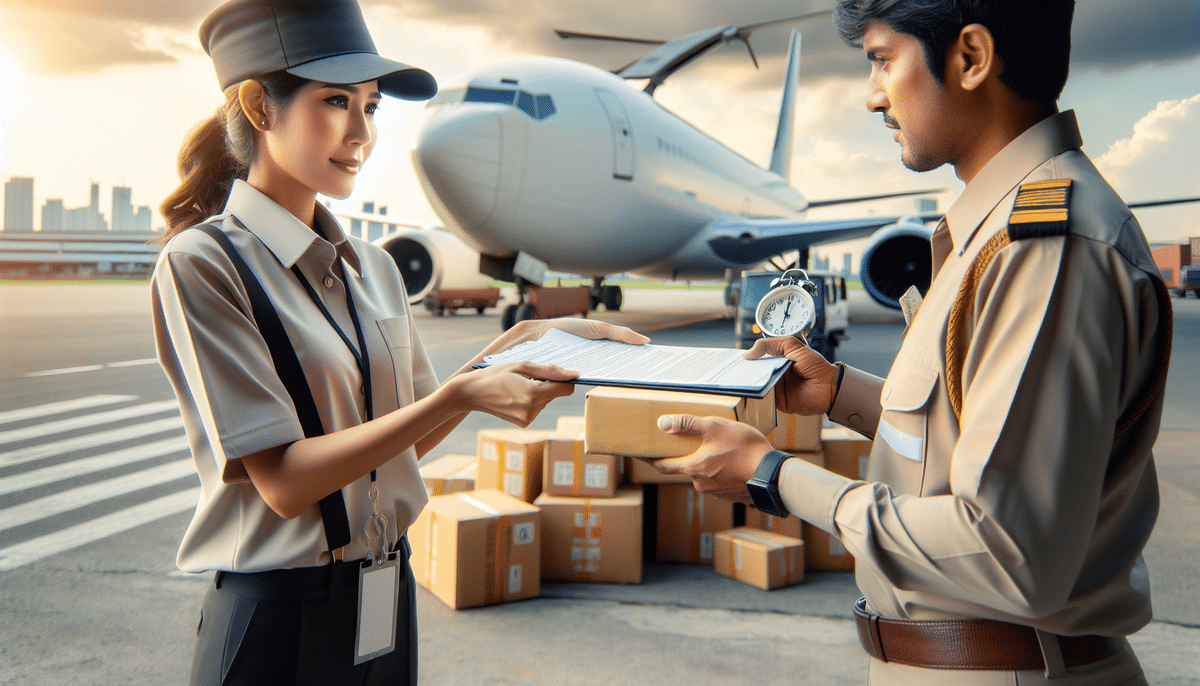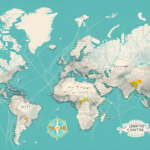Understanding the Process of UPS Worldwide Express Freight International Import Clearance Processing
Engaging in international trade requires a reliable and efficient method to transport goods across borders. One critical aspect of this process is import clearance processing, which ensures that shipments comply with the destination country's regulations. Proper management of import clearance can prevent delays, penalties, and ensure the smooth delivery of goods.
What is UPS Worldwide Express Freight?
UPS Worldwide Express Freight is a premier courier service specializing in the swift and secure handling of international shipments. Designed as an all-inclusive shipping solution, it manages every aspect of the transportation process, ensuring timely and intact deliveries.
One of the standout features of UPS Worldwide Express Freight is its extensive global reach, covering over 220 countries and territories. This expansive network makes it an ideal choice for businesses aiming to serve customers worldwide, from major metropolitan areas to remote regions.
Additionally, UPS offers a variety of customizable shipping options, including temperature-controlled shipments and hazardous materials handling. Enhanced by real-time tracking and monitoring, businesses can stay informed about their shipments at every stage, increasing transparency and reliability.
According to UPS's 2023 logistics report, the company handles over 21 million shipments annually, demonstrating its capability and reliability in global shipping operations (UPS Logistics Report 2023).
Why is International Import Clearance Processing Important in Shipping?
International import clearance processing is a fundamental component of global trade. It involves the inspection, assessment, and approval of shipments by customs officials before goods enter a country. Effective import clearance ensures that shipments comply with local laws, reducing the risk of delays, fines, or confiscation.
Beyond compliance, import clearance plays a crucial role in maintaining national security. Customs officials screen shipments for potential security threats, including illegal substances, weapons, and other prohibited items, safeguarding citizens and national interests.
Moreover, streamlined import clearance facilitates smoother trade relations between countries. By ensuring that all imports meet required standards, it prevents unfair competition and protects local industries. This not only promotes economic growth but also ensures consumers have access to high-quality international products.
According to the World Trade Organization (WTO), efficient customs procedures can reduce trade costs by up to 14%, highlighting the economic significance of effective import clearance processes (WTO Trade Costs Report).
How Does International Import Clearance Processing Work?
The import clearance process is intricate and varies by destination country, but generally follows these key steps:
- Shipment Arrival: Once the shipment arrives in the destination country, it is presented to customs officials for inspection.
- Documentation Review: Customs verifies the provided documents, such as commercial invoices and packing lists, to ensure compliance with local regulations.
- Duties and Taxes Assessment: Based on the shipment's value, origin, and type of goods, customs calculates the applicable duties and taxes.
- Inspection: If necessary, customs may physically inspect the goods to verify their contents and compliance.
- Payment and Release: Upon payment of duties and taxes, and after passing inspections, the shipment is cleared and released for delivery.
The duration of this process can range from a few days to several weeks, influenced by factors such as the complexity of the shipment and the efficiency of the customs authorities.
Documents Needed for International Import Clearance Processing
Accurate and complete documentation is vital for successful import clearance. Commonly required documents include:
- Commercial Invoice: Details the transaction between buyer and seller, including prices, quantities, and product descriptions.
- Packing List: Provides information about the packing materials and the contents of each package.
- Certificate of Origin: Verifies the country where the goods were manufactured.
- Import License: Required for certain regulated goods, granting permission to import specific products.
Depending on the destination country and the nature of the goods, additional documents such as permits, health certificates, or phytosanitary certificates may be necessary. Ensuring all required documentation is accurate and submitted promptly can prevent costly delays and complications.
For detailed requirements, businesses should consult official sources like the U.S. Customs and Border Protection or relevant authorities in the destination country.
Customs Regulations for International Import Clearance Processing
Customs regulations vary significantly between countries, making it essential for businesses to understand the specific rules governing their target markets. Key factors customs considers include:
- Type and Value of Goods: Classification determines duty rates and applicable taxes.
- Country of Origin: Affects tariff agreements and eligibility for reduced duties under trade agreements.
- Purpose of Shipment: Differentiates between commercial, personal, or charitable imports, each with distinct regulations.
Many countries impose restrictions on certain items, such as firearms, pharmaceuticals, and hazardous materials. Non-compliance can result in legal repercussions, fines, or shipment seizure. Collaborating with a knowledgeable customs broker or freight forwarder can help navigate these regulations effectively.
According to the OECD Trade Reports 2023, understanding and adhering to customs regulations is fundamental to minimizing operational risks in international trade.
How to Prepare for International Import Clearance Processing
Effective preparation for import clearance involves several strategic steps:
- Research Customs Regulations: Understand the specific import requirements and restrictions of the destination country.
- Accurate Documentation: Ensure all necessary documents are complete, accurate, and submitted on time.
- Proper Packaging: Use appropriate packing materials to protect goods and comply with labeling standards.
- Partner with Experts: Work with experienced freight forwarders or customs brokers to navigate complex clearance processes.
- Assess Duties and Taxes: Calculate potential fees in advance to manage costs effectively.
Proactive preparation can significantly reduce the likelihood of delays and additional expenses, ensuring a smoother import clearance experience.
Tips for a Smooth International Import Clearance Processing Experience
To enhance the efficiency of the import clearance process, consider the following tips:
- Comprehensive Documentation: Double-check all required documents for completeness and accuracy.
- Effective Packaging: Ensure shipments are securely packed and properly labeled to meet regulatory standards.
- Choose Reputable Couriers: Select courier services with proven expertise in handling international shipments.
- Stay Informed: Keep abreast of any regulatory changes in the destination country that may affect your shipments.
- Utilize Technology: Employ tracking and management tools to monitor shipments in real-time.
Implementing these strategies can help mitigate potential challenges and streamline the import clearance process, leading to timely and cost-effective deliveries.
Common Issues Faced During International Import Clearance Processing and How to Resolve Them
Despite thorough preparation, certain challenges may arise during import clearance, including:
- Incomplete Documentation: Missing or inaccurate documents can lead to delays or rejection of shipments.
- Duties and Taxes Discrepancies: Miscalculations can result in unexpected costs.
- Shipment Delays: Extended processing times can disrupt supply chains.
- Damaged or Missing Goods: Poor handling can compromise the integrity of shipments.
To address these issues:
- Collaborate with Couriers: Maintain open communication with your courier service to promptly resolve documentation or payment issues.
- Employ Customs Brokers: Utilize experts who can navigate regulatory complexities and facilitate quicker resolutions.
- Insure Shipments: Protect against potential damage or loss through appropriate insurance coverage.
Proactive communication and collaboration with all parties involved can effectively mitigate these common challenges.
Tracking Your Shipment During the International Import Clearance Processing
Monitoring shipments in real-time is crucial for managing the import clearance process effectively. Utilizing a courier service that offers robust tracking capabilities, such as UPS Tracking, allows businesses to:
- Stay updated on the shipment's location and status.
- Anticipate and address potential delays promptly.
- Provide accurate delivery estimates to customers.
Advanced tracking systems also facilitate better inventory management and responsive supply chain adjustments. According to a 2023 survey by the Supply Chain Visibility Report, businesses utilizing real-time tracking reported a 25% increase in on-time deliveries.
UPS Worldwide Express Freight vs Standard Shipping: Which is Better for Your Business Needs?
Choosing between UPS Worldwide Express Freight and standard shipping depends on your business requirements:
- Speed: Express freight offers expedited delivery, ideal for time-sensitive shipments.
- Cost: Standard shipping is generally more affordable but may have longer transit times.
- Shipment Size: Express freight can handle larger and heavier shipments, accommodating up to 150 pounds per package.
- Reliability: Express services often provide guaranteed delivery times and enhanced tracking features.
For businesses prioritizing quick delivery and reliable service, especially for critical or high-value goods, UPS Worldwide Express Freight is the superior choice. Conversely, for non-urgent shipments where cost savings are paramount, standard shipping may be more appropriate.
Data from the UPS Services Overview indicates that express freight services achieve a 98% on-time delivery rate, underscoring their reliability compared to standard shipping options.
How to Choose the Right Courier Service for Your International Import Clearance Processing Needs
Selecting the appropriate courier service is pivotal for seamless import clearance. Consider the following factors when making your choice:
- Speed and Reliability: Assess the delivery timelines and dependability of the courier service.
- Global Reach: Ensure the courier can handle shipments to your desired international destinations.
- Customization Options: Look for services that offer tailored solutions to meet your specific shipping needs.
- Customer Support: Reliable customer service can assist in resolving issues swiftly.
- Technology Integration: Advanced tracking and management tools enhance shipment visibility and control.
Businesses should evaluate potential couriers based on these criteria to ensure they align with their logistical and operational objectives.
Referencing industry benchmarks, the U.S. Department of Transportation emphasizes the importance of selecting couriers with robust compliance and security measures to mitigate risks in international shipping.
The Role of Technology in Improving the Efficiency of UPS Worldwide Express Freight International Import Clearance Processing
Technological advancements have revolutionized the landscape of international import clearance, enhancing efficiency and accuracy. Key technologies include:
- Integrated Scanning Systems: Automate the inspection process, reducing manual errors and speeding up clearance.
- Real-Time Tracking: Provides up-to-the-minute status updates, increasing transparency and operational control.
- Data Analytics: Analyzes shipment data to optimize routes, predict delays, and improve decision-making.
- Electronic Documentation: Streamlines the submission and verification of required documents, minimizing processing times.
UPS has invested significantly in these technologies, leading to enhanced service offerings and improved customer satisfaction. According to UPS's 2023 Annual Report, their investment in technology has resulted in a 15% increase in operational efficiency and a 10% reduction in shipment processing times.
Additionally, innovations like blockchain for secure and transparent transactions are being explored to further enhance the import clearance process (IBM Blockchain Solutions).
Understanding Customs Duties and Taxes in UPS Worldwide Express Freight International Import Clearance Processing
Customs duties and taxes are essential considerations in international shipping, impacting the overall cost structure of import operations. These charges are determined based on several factors:
- Value of Goods: Higher-value items incur higher duties and taxes.
- Type of Goods: Different product categories have varying duty rates.
- Country of Origin: Trade agreements between countries can influence duty rates, sometimes allowing for reduced or waived tariffs.
UPS Worldwide Express Freight assists businesses in navigating these financial obligations by providing detailed estimates and facilitating the payment of duties and taxes. Understanding these costs is crucial for accurate budgeting and pricing strategies.
For comprehensive guidance, consult resources like the Harmonized Tariff Schedule provided by the U.S. International Trade Commission, which outlines duty rates for various goods.
The Future of UPS Worldwide Express Freight International Import Clearance Processing: Innovations and Trends
The future of UPS Worldwide Express Freight and international import clearance processing is poised for significant advancements, driven by technological innovation and evolving global trade dynamics. Emerging trends include:
- Automation and AI: Leveraging artificial intelligence to predict and optimize clearance processes, reducing manual intervention.
- Enhanced Cybersecurity: Strengthening data protection measures to safeguard sensitive shipment information.
- Sustainability Initiatives: Implementing eco-friendly practices to minimize the environmental impact of shipping operations.
- Blockchain Integration: Utilizing blockchain for transparent and immutable transaction records, enhancing trust and efficiency.
As global trade continues to grow, UPS is dedicated to adapting and innovating to meet the changing needs of businesses. Investments in research and development, as well as strategic partnerships, will likely play a pivotal role in shaping the future landscape of import clearance processing.
In summary, international import clearance processing is a critical element of global trade, ensuring that goods move smoothly and compliantly across borders. UPS Worldwide Express Freight offers a robust and reliable solution, equipped with advanced technologies and comprehensive services to support businesses in their international shipping endeavors.






















